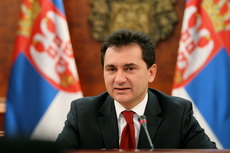- Serbia
Get to know Serbia
- Citizens
Culture and science
Health services
Pension and disability insurance
- Business
Employment
Economy
- Media
- Government
- Contact
Keep in touch
Contact form
Back
Keepin touch
Whether you have a question, comment, suggestion or any problem in the purview of the government, send us your message and we will try to respond as soon as possible. If your problem is not in our purview, we will forward your message to the relevant institution.
Q:
A:
Serbia expects beginning of SAA ratification process
Belgrade,
14 June 2010
Deputy Prime Minister for EU Integration Bozidar Djelic expressed hope in the EU External Relations Council greenlighting the ratification of the Stabilisation and Association Agreement (SAA) with Serbia today.
Djelic told today’s Blic daily, prior to today’s session of the EU External Relations Council in Luxembourg, that the recent visit of the ICTY Chief Prosecutor Serge Brammertz to Belgrade was successful, which gives hope for the SAA’s ratification to start today, allowing Serbia to receive associated EU member status.
He said, however, that the meeting will not involve discussion of Serbia’s EU candidacy yet as there is still no consensus among member states regarding this issue although Spain, the presiding country, has been doing everything to accelerate Serbia’s EU integration process.
The Deputy Prime Minister declared that this issue will be addressed in autumn and stated that on 17 June he will informally present EU Enlargement Commissioner Stefan Fule with 4,400 pages of responses to questionnaires that our neighbours had received when their readiness to become candidates was examined.
Djelic pointed out that Fule recently reiterated that Serbia’s EU integration and the Kosovo-Metohija issue are two separate processes.
2009 was Serbia’s most successful year ever as far as EU integration is concerned, with a great annual report, implementation of the Transitional Trade Agreement, visa abolishment and submittal of candidacy request, Djelic outlined but noted that this year, with the crisis in Greece and an instable euro has been more difficult for all European countries, including Serbia.
Djelic affirmed that the Serbian government wants to be part of the solution for Kosovo-Metohija and that practical issues should primarily be discussed between Serbian and EULEX officials.
The Deputy Prime Minister stressed that the association process will not slow down when Belgium takes over the EU presidency on 1 July and that Belgian Prime Minister Yves Leterme during his visit to Belgrade confirmed that Belgium understands the problems of the Balkans and Serbia.
We are doing our part of the job as the integration process primarily depends on domestic reform, Djelic underlined and added that EU integration is much more about reform than lobbying.
He said, however, that the meeting will not involve discussion of Serbia’s EU candidacy yet as there is still no consensus among member states regarding this issue although Spain, the presiding country, has been doing everything to accelerate Serbia’s EU integration process.
The Deputy Prime Minister declared that this issue will be addressed in autumn and stated that on 17 June he will informally present EU Enlargement Commissioner Stefan Fule with 4,400 pages of responses to questionnaires that our neighbours had received when their readiness to become candidates was examined.
Djelic pointed out that Fule recently reiterated that Serbia’s EU integration and the Kosovo-Metohija issue are two separate processes.
2009 was Serbia’s most successful year ever as far as EU integration is concerned, with a great annual report, implementation of the Transitional Trade Agreement, visa abolishment and submittal of candidacy request, Djelic outlined but noted that this year, with the crisis in Greece and an instable euro has been more difficult for all European countries, including Serbia.
Djelic affirmed that the Serbian government wants to be part of the solution for Kosovo-Metohija and that practical issues should primarily be discussed between Serbian and EULEX officials.
The Deputy Prime Minister stressed that the association process will not slow down when Belgium takes over the EU presidency on 1 July and that Belgian Prime Minister Yves Leterme during his visit to Belgrade confirmed that Belgium understands the problems of the Balkans and Serbia.
We are doing our part of the job as the integration process primarily depends on domestic reform, Djelic underlined and added that EU integration is much more about reform than lobbying.
-
 Belgrade/Brussels, 19 November 2025
Belgrade/Brussels, 19 November 2025European integration shared responsibility of entire society
-
 Belgrade, 29 October 2024
Belgrade, 29 October 2024State moves to minimise advertising for betting shops
-
 Belgrade/Berlin, 28 January 2016
Belgrade/Berlin, 28 January 2016Fences cannot stop migrations
-
 Belgrade, 7 January 2016
Belgrade, 7 January 2016Serbia to experience dynamic economic growth in 2016
-
 Belgrade, 31 December 2015
Belgrade, 31 December 2015Serbia will persevere on path of development, reforms
-
 Belgrade, 30 December 2015
Belgrade, 30 December 2015Ground for Serbia’s progress set
-
 Belgrade, 28 December 2015
Belgrade, 28 December 2015Serbia ready for improvement of cooperation with Russia
-
 Belgrade, 22 December 2015
Belgrade, 22 December 2015Serbia ready to open six more chapters next year
-
 Belgrade, 21 December 2015
Belgrade, 21 December 2015Serbia to be part of EU by 2020
-
 Belgrade, 20 December 2015
Belgrade, 20 December 2015Serbia ready for EU membership by 2019


